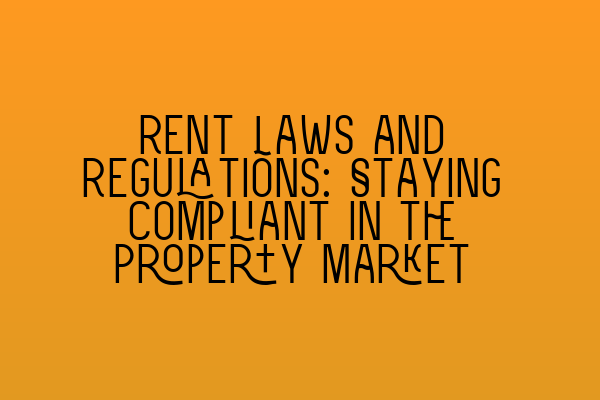Rent Laws and Regulations: Staying Compliant in the Property Market
As a property owner or landlord, it is crucial to understand and comply with the various rent laws and regulations that govern the property market. Failing to do so can result in legal consequences and financial liabilities. In this blog post, we will explore key rent laws and regulations, and provide valuable insights on how to stay compliant.
The Importance of Rent Laws and Regulations
Rent laws and regulations are in place to protect the rights of both property owners and tenants. They ensure fair and equitable treatment in the rental market, prevent discrimination, maintain property standards, and establish clear guidelines for rent increases, evictions, and lease agreements.
By staying informed and compliant with these laws and regulations, property owners can minimize risks, maintain positive landlord-tenant relationships, and protect their investments. Tenants, on the other hand, benefit from having their rights upheld and living in safe and well-maintained properties.
Rent Increase Laws
One important aspect of rent laws and regulations is the rules surrounding rent increases. Each jurisdiction may have specific laws governing how often and by what percentage landlords can raise rents. It is crucial to familiarize yourself with these laws to avoid legal disputes and potential penalties.
For example, in some areas, rent increases are limited to a certain percentage per year, while others may require landlords to provide a valid reason for the increase. If you are unsure about the rules in your jurisdiction, consult with a property law expert to ensure you are acting within the legal boundaries.
Lease Agreements and Rent Regulations
Another critical area of rent laws and regulations is lease agreements. A robust and legally compliant lease agreement is essential to protect the rights of both landlords and tenants. A well-drafted lease agreement should cover important aspects such as rent payment terms, maintenance responsibilities, entry rights, and dispute resolution procedures.
Additionally, some jurisdictions may impose specific rent regulations that landlords must comply with. These regulations may include rent control measures, restrictions on security deposits, or requirements for providing notice before entering a rental property.
To ensure compliance, it is advisable to seek legal advice when drafting or reviewing lease agreements. Legal professionals specializing in property law can help ensure that your lease agreement is comprehensive, fair, and compliant with all relevant rent laws and regulations.
Discrimination Laws in Renting
Rent laws also encompass regulations to prevent discrimination in the rental market. Property owners must be aware of these laws to avoid any discriminatory practices and treat all prospective tenants equally and fairly.
Discrimination laws prohibit landlords from refusing to rent to individuals based on protected characteristics such as race, religion, gender, disability, or family status. It is crucial to conduct tenant screenings and selection processes in a manner that complies with these laws and does not involve any discriminatory practices.
Eviction Laws and Procedures
Evictions, though often unfortunate, can be a necessary course of action for landlords in certain situations. However, it is essential to follow the correct legal procedures to avoid legal backlash. Eviction laws and regulations vary by jurisdiction, so it is vital to familiarize yourself with the specific rules in your area.
Common grounds for eviction include non-payment of rent, violation of lease terms, and property damage. To initiate eviction proceedings, landlords must typically provide proper notice, follow specific timelines, and file necessary documents with the relevant court. Failure to comply with eviction laws can result in delays, legal disputes, or even financial penalties.
Staying Compliant with Rent Laws and Regulations
To ensure compliance with rent laws and regulations, property owners and landlords should consider the following practices:
- Stay updated: Keep abreast of any changes or updates to rent laws and regulations in your area. Regularly check government websites, consult with legal professionals, and attend relevant seminars or workshops.
- Seek legal advice: Property law can be complex and varies from jurisdiction to jurisdiction. It is always advisable to seek legal counsel when drafting lease agreements, dealing with eviction procedures, or handling any rent-related matters.
- Keep detailed records: Maintain thorough records of rent payments, lease agreements, repairs, and any communication with tenants. These records can serve as evidence to support your compliance and protect your interests in case of legal disputes.
- Communicate clearly: Establish open and transparent communication with tenants. Make sure they are aware of their rights and responsibilities, and provide clear and timely information regarding any changes to rent payments or lease agreements.
- Regular property inspections: Conduct regular inspections to ensure that your property meets safety and maintenance requirements. Address any issues promptly to maintain compliance with property standards.
By adopting these practices, property owners and landlords can navigate the complex landscape of rent laws and regulations with confidence and minimize the risk of legal complications.
Conclusion
Complying with rent laws and regulations is crucial for property owners and landlords to protect their investments, ensure fair treatment of tenants, and avoid legal disputes. Understanding the intricacies of rent laws, such as rent increase regulations, lease agreements, discrimination laws, and eviction procedures, is essential.
To stay compliant, it is important to stay informed, seek legal advice when necessary, maintain detailed records, communicate clearly with tenants, and conduct regular property inspections. By doing so, property owners and landlords can ensure their operations are compliant and maintain positive relationships with tenants in the property market.
Related Articles:
